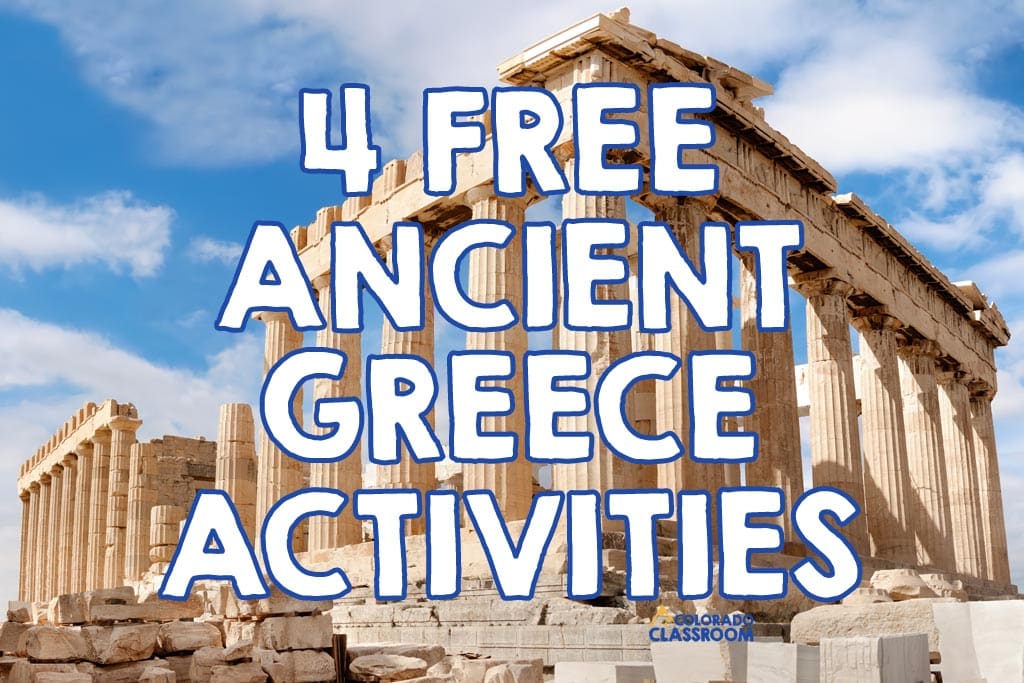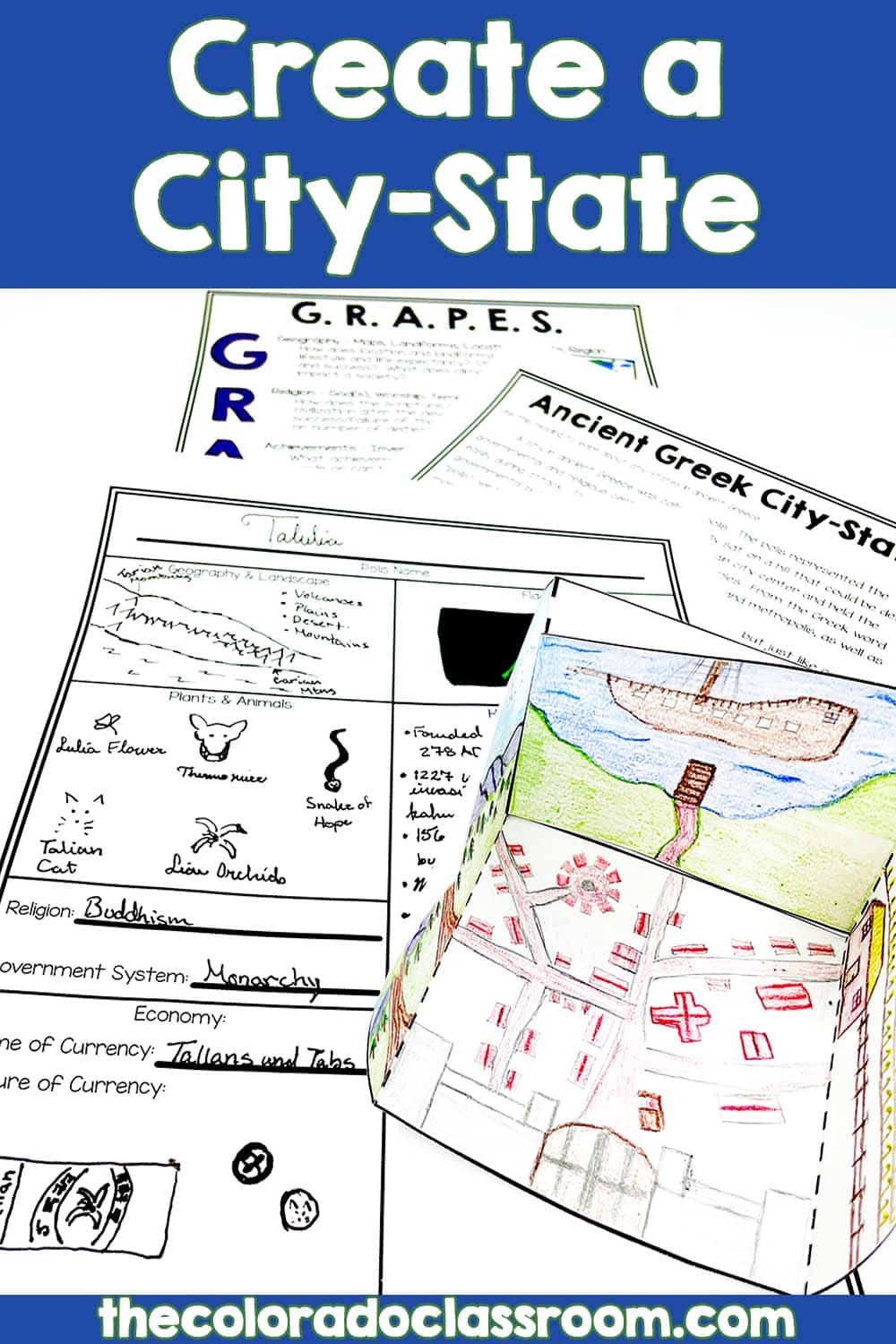4 Ancient Greece Activities that are Fabulous & Free
Are you looking for some fabulous Ancient Greece activities? With approximately 1000 years of history to choose from, there is just so much to learn about this ancient civilization. I can’t begin to cover it all in one post. Today I have assembled some of my favorite lessons to help you during your teachings on one of the most influential periods on the planet. Even better, these ideas are great for people on a budget because all these lessons are free!

Start with Geography

At roughly the size of Florida, ten million people live on the mountainous and rocky peninsula that makes up Greece. With this free 15-page slideshow on the geography of Ancient Greece, you’ll be able to teach the basics of geography. Bright and colorful slides and beautiful photographs in this slideshow will keep your student’s attention as they learn about the land and sea of this ancient civilization. Grab a map of Greece for students to label as they watch the slideshow. Dive in deeper and do a real dig into geography. Regardless of your choice, the free slideshow is just one of several Ancient Greece activities to get you started learning about this ancient civilization.
Explore Time
Once I’ve taught geography, I like to look at the timeline of a civilization. Having students grasp the general gist of when a civilization existed is essential. How long did it survive? What significant events occurred between its rise and fall? When and what ultimately led to its demise? These all help to front-load the students, so they are more prepared for the learning that’s about to take place.

Looking at a timeline of ancient Greece and discussing the Peloponnesian War prepares the students for that vocabulary word. It reminds them of that geography and keeps them aware of that material. They begin waiting and looking for it, even subconsciously, as they start learning about the history of the civilization. Timelines are great activities to help introduce the material. They show the overlapping of cultures and events. They build knowledge and help with students’ understanding of mathematical conceptualism.
Create a City-State
One of the most popular ways to teach history or social studies civilizations is through the GRAPES acronym. G stands for geography, R is for religion, A is for achievements, and so on. I primarily use this method when I teach my ancient civilization units, but I don’t call it out so expressly. This free Ancient Greece activity focuses on the GRAPES acronym and has students use it to create their own city-state.

I’ve had my students draw and color a city-state for years, but I got this idea after going away for a quick trip. In my absence, my daughter and husband created a “country.” When I got home, they couldn’t wait to tell me about all the aspects of their made-up land. They had a name, a language, a history, and they had designed it all in just three days. It was intriguing that they had such fun with this make-believe task that I incorporated it into my Ancient Greece activities unit.
So in this free lesson, students read about the Ancient Greek city-state and the workings of the GRAPES acronym. They then fill out a city-state development sheet, naming their city-state, giving it a religion, a currency, designing a flag, determining its history, and so on. Lastly, they draw and color what their city-state would look like from an aerial view. In just a day or two, you can have a whole world of diverse city-states erupt in your classroom, giving rise to discussion, comparison, gallery walks, and much more. It’s a fabulous way to look at Ancient Greece.
Build Philosophical Reasoning
Another idea the Greeks were known for is their rich history of philosophy. From Socrates to Aristotle, to Plato, and others, the Greeks mastered the concept of philosophy, thought, and ethics. To capture this idea, help your students develop their ability to reason philosophically.

If you have 3rd, 4th, or 5th graders, play “This or That” and have them choose between two objects. Get them up and out of their seats and have them move back and forth across the classroom to help get the blood flowing and the energy going. For instance, ask them, “Cereal or Pancakes?” and point to the left for cereal and the right for pancakes. Give students a moment or two to move to their choice, and then pick a couple of students to explain why they made their choice. Allow students to speak in front of their peers, explain and reason, verbalize preferences, and much more.
If you have older students, you can play Four Corners. In each corner of the room, place a sign or poster that says one of the following: “Strongly Agree,” “Agree,” “Disagree,” or “Strongly Disagree.” Next, pose questions to the class that they can answer on a scale such as this one.
Questions can be fun, such as, “Chocolate ice cream is the best flavor ice cream.” They can also be more serious, such as, “The invention of the combustion engine was the single biggest contributor to pollution in the world.” Once students get to their corner, give them a few minutes to discuss their position as a group and re-locate as necessary. Then, ask a few students, maybe one from each corner, to explain their position and why they feel the way they do.
Look for questions you can ask about the curriculum you have studied. Some possible ideas for Ancient Greece are:
Athens or Sparta?
Zeus or Poseidon?
Persian War or Peloponnesian War?
Sparta and Leonidas’ act during the Persian War was selfless and brave.
The Spartans were the superior city-state in ancient Greece.
Alexander the Great was the most outstanding leader throughout ancient civilizations.
I hope this has helped you develop some fabulously free Ancient Greece activities. They’re one of my favorite civilizations to study, so I’d love to hear about what you’re doing in your classroom.


